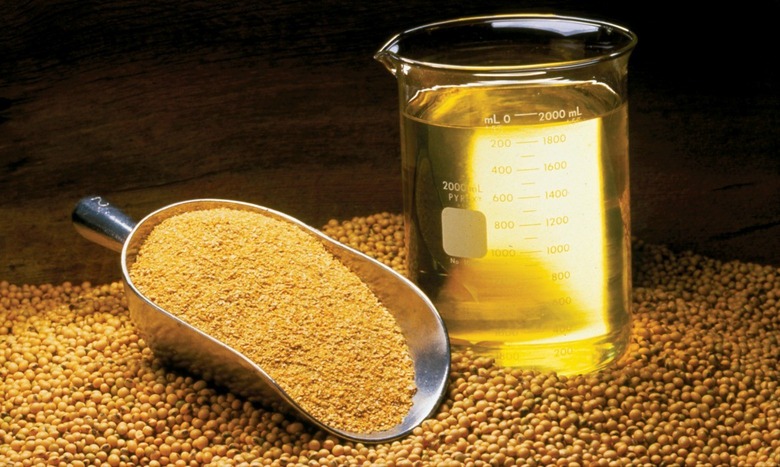You Might Want To Pass On Foods With These 9 Ingredients
"Processed food is perhaps the most damaging aspect of most people's diet, contributing to poor health and chronic disease," says Dr. Mercola in "Soybean Oil: One of the Most Harmful Ingredients in Processed Foods."
There's not much more to say than that. Eating processed foods with artificial sweeteners, preservatives, and thickening agents has been shown time and time again to lead to negative consequences and poor health in many humans. Keep reading to see which ingredients should be avoided at all costs.
BHT (Butylated Hydroxytoluene)
BHT, as told by The Daily Meal special contributor Lauren Gordon, is "an additive that preserves fats and oils in your foods... [and] an antioxidant that prevents food from going rancid and is found commonly in chewing gum, dry breakfast cereals, and potato flakes. Though considered to be safe, it is linked to adverse interactions when consumed alongside hormonal birth-control methods or steroid hormones. It also may affect chemical balances in the brain and cause sufficient behavioral changes, as was evident in a study of mice offspring that had a diet including one percent of BHA."
Bleached White Flour
Bleached and enriched flours should be avoided in favor of whole-grain flours. Gordon writes about this, saying, "From its smell to its taste, bread is pretty amazing: a little too amazing, if you ask some doctors. While whole grains and good carbs are essential to your diet, too much bread (or really anything made with bleached, white flour) can be detrimental to your health and weight."
High Fructose Corn Syrup (HFCS)
Spoon University discusses HFCS: "High fructose corn syrup is a sweetener that is commonly used as a substitute for sucrose since it's cheaper and gives a sweeter taste," they say, and "some professionals believe that this highly processed substance affects normal appetite function and contributes to the obesity epidemic."
Partially Hydrogenated Oil
"Trans fats," such as partially hydrogenated oils, says Dan Myers, the Senior Eat/Dine Editor for The Daily Meal, "have no nutritional value. While saturated fat (most commonly found in animal fat and cheese) and trans fats increase levels of LDL ('bad' cholesterol), trans fats actually decrease the level of HDL ('good' cholesterol) in the bloodstream, increasing the risk of heart disease. While it's impossible to completely avoid all trans fats due to their presence in nature, the National Academy of Sciences advises cutting them out of your diet as much as possible, and the best place to start is avoiding all foods with the phrase 'partially hydrogenated' anywhere in the ingredients list."
Polysorbate 60
The best reason to avoid polysorbate 60 has been described on The Daily Meal before.
"Polysorbate 60 is one of many chemical compounds in a Twinkie. One of the ingredients in polysorbate 60 is ethylene oxide, a highly flammable material that's toxic if consumed in extremely high amounts. It was used in grenades during the Vietnam War."
Propylene glycol alginate (E405)
Propylene glycol was featured in a piece by The Daily Meal's Associate Editor Joanna Fantozzi titled "Common Foods and Drinks Hiding the Antifreeze Compound." Need we say more?
Sodium Benzoate
The Daily Meal's Dan Myers also wrote about sodium benzoate, saying that it's a "benzoic acid-derived salt [that] kills bacteria in acidic conditions, so it can be found in everything from salad dressings to pickles to Aunt Jemima pancake syrup. It's come under fire in recent years because it's been discovered that toxic benzene can be produced when combined with vitamin C, but it's in the process of being phased out of most products that contain both of those, as well as Coca-Cola products."
Sodium Nitrate
"The Mayo Clinic's Martha George, M.D., concluded that sodium nitrate is linked to heart disease and cancer," says The Daily Meal special contributor Lauren Gordon. "Dr. George discovered that it damages blood vessels, possibly causing arteries to narrow and harden."
Soybean Oil
Dr. Mercola says, "Part of the problem with partially hydrogenated soybean oil is the trans fat it contains. The other part relates to the health hazards of soy itself. And an added hazard factor is the fact that the majority of both corn and soybeans are genetically engineered."
For more about the potential health hazard of soybean oil, check out the full story here.
